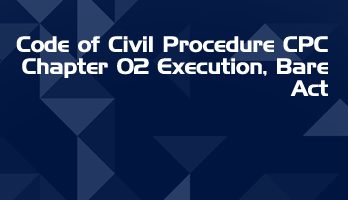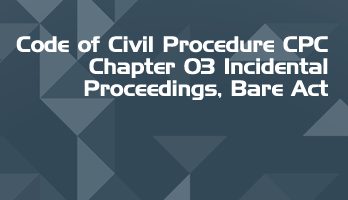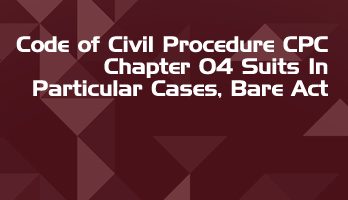A 'Bare act' is the actual legislation passed by the Parliament of India. Generally, an act sets out the high level legal and policy principles applicable to the subject matter of the law.
Most acts are accompanied by 'subsidiary legislation' such as rules, regulations, notifications and orders; which address the actual implementation detail of the act.
Free Full Course Available on LawMint's YouTube Channel
How to Land Your Dream LLB Internship in a Top Law Firm
- Part 1 - Introduction
- Part 2 - Internship Planning
- Part 3 - Internship Research
- Part 4 - Building Your Profile
- Part 5 - The Email
- Part 6 - The Resume
- Part 7 - The Cover Letter
- Part 8 - The Interview
- Part 9 - Self Development
Practical and comprehensive course, with real examples and step-by-step analysis of the complete internship application process. Check out LawMint's YouTube channel now!
Code of Criminal Procedure, 1973
Chapter 7A – Reciprocal Arrangements for Assistance in Certain Matters and Procedure for Attachment and Forfeiture of property
Section 105A – Definitions
In this Chapter, unless the context otherwise requires, –
- “contracting State” means any country or place outside India in respect of which arrangements have been made by the Central Government with the Government of such country through a treaty or otherwise;
- “identifying” includes establishment of a proof that the property was derived from, or used in, the Commission of an offence;
- “proceeds of crime” means any property derived or obtained directly or indirectly, by any person as a result of criminal activity (including crime involving currency transfers) or the value of any such property;
- “property” means property and assets of every description whether corporeal or incorporeal, movable or immovable tangible or intangible and deeds and instruments evidencing title to, or interest in, such property or assets derived or used in the Commission of an offence and includes properly obtained through proceeds of crime;
- “tracing” means determining the nature source, disposition, movement, title or ownership of property.
Section 105B – Assistance in securing transfer of persons
- Where a Court in India, in relation to a criminal matter, desires that a warrant for arrest of any person to attend or produce a document or other thing issued by it shall be executed in any place in a contracting State, it shall send such warrant in duplicate in such form to such Court, Judge or Magistrate through such authority, as the Central Government may, by notification, specify in this behalf and that Court, Judge or Magistrate, as the case may be, shall cause the same to be executed.
- Notwithstanding anything contained in this Code, if, in the course of an investigation or any inquiry into an offence, an application is made by the investigating officer or any officer superior in rank to the investigating officer that the attendance of a person who is in any place in a contracting State is required in connection with such investigation or inquiry and the Court is satisfied that such attendance is so required, it shall issue a summons or warrant, in duplicate, against the said person to such Court, Judger Magistrate, in such form as the Central Government may, by notification, specify in this behalf, to cause the same to be served or executed.
- Where a Court in India, in relation to a criminal matter, has received a warrant for arrest of any person requiring him to attend or attend and produce a document or other thing in that Court or before any other investigating agency, issued by a Court, Judge or Magistrate in a contracting State, the same shall be executed as if it is the warrant received by it from another Court in India for execution within its local limits.
- Where a person transferred to a contracting State pursuant to Sub – Section (3) is a prisoner in India, the Court in India or the Central Government may impose such conditions as that Court or Government deems fit.
- Where the person transferred to India pursuant to Sub – Section (1), or Sub – Section (2) is a prisoner in a contracting State, the Court in India shall ensure that the conditions subject to which the prisoner is transferred to India are complied with and such prisoner shall be kept in such custody subject to such conditions as the Central Government may direct in writing.
Section 105C – Assistance in relation to orders of attachment or forfeiture of property
- Where a Court in India has reasonable grounds to believe that any property obtained by any person is derived or obtained, directly or indirectly, by such person from the commission of an offence, it may make an order of attachment or forfeiture of such property, as it may deem fit under the provisions of sections 105D to 105J (both inclusive).
- Where the Court has made an order for attachment or forfeiture of any property under Sub – Section (1), and such property is suspected to be in a contracting State, the Court may issue a letter of request to a Court or an authority in the contracting State for execution of such order.
- Where a letter of request is received by the Central Government from a Court or an authority in a contracting State requesting attachment or forfeiture of the property in India, derived or obtained, directly or indirectly, by any person from the commission of an offence committed in that contracting State, the Central Government may forward such letter of request to the Court, as it thinks fit, for execution in accordance with the provisions of sections 105D to 105J (both inclusive) or, as the case may be, any other law for the time being in force.
Section 105D – Identifying unlawfully acquired property
- The Court shall, under Sub – Section (1), or on receipt of a letter of request under Sub – Section (3) of section 105C, direct any police officer not below the rank of Sub – Inspector of Police to lake all steps necessary for tracing and identifying such property.
- The steps referred to in Sub – Section (1) may include any inquiry, investigation or survey in respect of any person, place, property, assets, documents, books of account in any bank or public financial institutions or any other relevant matters.
- Any inquiry, investigation or survey referred to in Sub – Section (2) shall be carried out by an officer mentioned in Sub – Section (1) in accordance with such directions issued by the said Court in this behalf.
Section 105E – Seizure or attachment of property
- Where any officer conducting an inquiry or investigation under section 105D has a reason to believe that any property in relation to which such inquiry or investigation is being conducted is likely to be concealed, transferred or dealt with in any manner which will result in disposal of such property, he may make an order for seizing such property and where it is not practicable to seize such property, he may make an order of attachment directing that such property shall not be transferred or otherwise dealt with, except with the prior permission of the officer making such order, and a copy of such order shall be served on the person concerned.
- Any order made under Sub – Section (1) shall have no effect unless the said order is confirmed by an order of the said Court, within a period of thirty days of its being made.
Section 105F – Management of properties seized or forfeited under this Chapter
- The Court may appoint the District Magistrate of the area where the property is situated, or any other officer that may be nominated by the District Magistrate, to perform the functions of an Administrator of such property.
- The Administrator appointed under Sub – Section (1) shall receive and manage the property in relation to which the order has been made under Sub – Section (I) of section 105E or under section 105H in such manner and subject to such conditions as may be specified by the Central Government.
- The Administrator shall also take such measures, as the Central Government may direct, to dispose of the property which is forfeited to the Central Government.
Section 105G – Notice of forfeiture of property
- If as a result of the inquiry, investigation or survey under section 105D, the Court has reason to believe that all or any of such properties are proceeds of crime, it may serve a notice upon such person (hereinafter referred to as the person affected) calling upon him within a period of thirty days specified in the notice to indicate the source of income, earning or assets, out of which or by means of which he has acquired such property, the evidence on which he relies and other relevant information and particulars, and to show cause why all or any of such properties, as the case may be, should not be declared to be proceeds of crime and forfeited to the Central Government.
- Where a notice under Sub – Section (1) to any person specifies any property as being held on behalf of such person by any other person, a copy of the notice shall also be served upon such other person.
Section 105H – Forfeiture of property in certain cases
- The Court may, after considering the explanation, if any, to the show – cause notice issued under section 105G and the material available before it and after giving to the person affected (and in a case where the person affected holds any property specified in the notice through any other person, to such other person also) a reasonable opportunity of being heard, by order, record a finding whether all or any of the properties in question are proceeds of crime: Provided that if the person affected (and in a case where the person affected holds any property specified in the notice through any other person such other person also) does not appear before the Court or represent his case before it within a period of thirty days specified in the show – cause notice, the Court may proceed to record a finding under this Sub – Section Ex – parte on the basis of evidence available before it.
- Where the Court is satisfied that some of the properties referred to in the show cause notice are proceeds of crime but it is not possible to identify specifically such properties, then, it shall be lawful for the Court to specify the properties which, to the best of its judgement, are proceeds of crime and record a finding accordingly under Sub – Section (1).
- Where the Court records a finding under this section to the effect that any property is proceeds of crime, such property shall stand forfeited to the Central Government free from all encumbrances.
- Where any shares in a company stand forfeited to the Central Government under this section, then, the company shall, notwithstanding anything contained in the Companies Act, 1956 (1 of 1956) or the articles of association of the company, forthwith register the Central Government as the transferee of such shares.
Section 105I – Fine in lieu of forfeiture
- Where the Court makes a declaration that any property stands forfeited to the Central Government under section 105H and it is a case where the source of only a part of such property has not been proved to the satisfaction of the Court, it shall make an order giving an option to the person affected to pay, in lieu of forfeiture, a fine equal to the market value of such part.
- Before making an order imposing a fine under Sub – Section (1), the person affected shall be given a reasonable opportunity of being heard.
- Where the person affected pays the fine due under Sub – Section (1), within such time as may be allowed in that behalf, the Court may, by order, revoke the declaration of forfeiture under section 105H and thereupon such property shall stand released
Section 105J – Certain transfers to be null and void
Where after the making of an order under Sub – Section (1) of section 105E or the issue of a notice under section 105G, any property referred to in the said order or notice is transferred by any mode whatsoever such transfers shall, for the purposes of the proceedings under this Chapter, be ignored and if such property is subsequently forfeited to the Central Government under section 160H, then the transfer of such property shall be deemed to be null and void.
Section 105K – Procedure in respect of letter of request
Every letter of request, summons or warrant, received by the Central Government from, and every letter of request, summons or warrant, to be transmitted to a contracting State under this Chapter shall be transmitted to a contracting State or, as the case may be, sent to the concerned Court in India in such form and in such manner as the Central Government may, by notification, specify in this behalf.
Section 105L – Application of this Chapter
The Central Government may, by notification in the Official Gazette, direct that the application of this Chapter in relation to a contracting State with which reciprocal arrangements have been made, shall be subject to such conditions, exceptions or qualifications as are specified in the said notification.
Important Central Acts in Regional Languages
Legislative department website also features regional language versions of several important Central Acts.
Free Full Course Available on LawMint's YouTube Channel
How to Land Your Dream LLB Internship in a Top Law Firm
- Part 1 - Introduction
- Part 2 - Internship Planning
- Part 3 - Internship Research
- Part 4 - Building Your Profile
- Part 5 - The Email
- Part 6 - The Resume
- Part 7 - The Cover Letter
- Part 8 - The Interview
- Part 9 - Self Development
Practical and comprehensive course, with real examples and step-by-step analysis of the complete internship application process. Check out LawMint's YouTube channel now!












